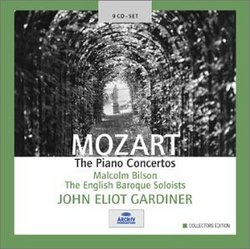| All Artists: Wolfgang Amadeus Mozart, John Eliot Gardiner, English Baroque Soloists, Malcolm Bilson, Robert Levin, Melvyn Tan Title: Mozart: The Piano Concertos Members Wishing: 0 Total Copies: 0 Label: Archiv Produktion Release Date: 3/13/2001 Album Type: Box set Genre: Classical Styles: Chamber Music, Forms & Genres, Concertos, Historical Periods, Classical (c.1770-1830), Instruments, Keyboard Number of Discs: 9 SwapaCD Credits: 9 UPC: 028946311127 |
Search - Wolfgang Amadeus Mozart, John Eliot Gardiner, English Baroque Soloists :: Mozart: The Piano Concertos
 | Wolfgang Amadeus Mozart, John Eliot Gardiner, English Baroque Soloists Mozart: The Piano Concertos Genre: Classical
|
Larger Image |
CD DetailsSimilar CDs |
CD ReviewsWonderful jmgf77 | New Haven, CT | 03/29/2001 (5 out of 5 stars) "An excellent survey of Mozart's original piano concertos (5 through 27, the first four being pastiches), recorded between 1983 and 1988 and now reissued in a mid-price format by Archiv. Bilson and Gardiner are two of the luminaries of period performance, so one naturally has the highest expectations, although the more recent set by Levin and Hogwood does offer some serious competition. And, while the collaboration improves both in polish and rapport as the set progresses, these performances are sure not to disappoint. Following contemporary practice, Bilson plays continuo throughout, a touch which may surprise some listeners brought up on modern-instrument records. Similarly, Bilson's cadenzas could seem restrained to those viewing these works through the lens of the Romantic piano concerto, though he is also at liberty to ornament the written part more freely. But the delicacy of the slow movement of the 23rd concerto here needs no apologies, even held up again Horowitz's late recording; and often-- as in the cadenza to the last concerto, drawing upon "Sehnsucht nach dem Fruhlinge," a song Mozart composed around the same time-- the scholarship backing these performances up only enhances their invention and charm. An excellent collection, and an even better deal." Man-eating piano slain Paul S. | California | 02/23/2006 (5 out of 5 stars) "It's not that Bilson is the world's greatest (forte-) pianist, although he's very, very good. (He's better as a performer than as a composer--he uses his own cadenzas where better ones, such as Beethoven's in #20, are commonly played.) It's not that two centuries of developing the modern piano were wasted effort, and the fortepiano sounds best after all. It's not that history trumps musicality. What makes these recordings great is that an appropriate balance between soloist and orchestra is restored. Anyone with a sense of musical proportion, who listens carefully to recordings of piano concertos, can tell that the piano is often in the foreground when it belongs in the background, and backup from other instruments is often nearly inaudible. Of course this is especially true of the earlier concertos (Bach, Haydn, Mozart), which were scored and written based on the feeble solo instruments of the time. Here, Archiv's restraint in miking/mixing, on top of the severe limitations of the fortepiano, greatly shifts the balance of power back towards the orchestra. This is not invariably an improvement, but most of the time it restores proper proportion to Mozart's music, with outstanding results. Often it adds drama, because instead of floating above the orchestral fray, the soloist must play very forcefully to address the competing sound of the orchestra. Perhaps the orchestra plays with a bit more conviction knowing they're not just going to be overrun by a Steinway the size of an Amtrak. As Bilson was literally the first to admit (in the original CD notes), the fortepianos he plays cannot deliver the long legato line that pianists use to great effect in the slow movements. So there is much to be said for hearing these works on the modern piano. But Bilson and Gardiner take the bull by the horns, pick up the tempo as needed, and make the slow movements convincing on their own terms. I got the full-priced edition years ago, and greatly enjoy going back and forth between it and modern-piano versions. Highly, though not exclusively, recommended." Takes you back to 18th-century Vienna Alan Lekan | Boulder, CO | 07/06/2005 (5 out of 5 stars) "So far, not one reviewer here rated this unique set of Mozart's grand concertos below a perfect 5 stars. I think everyone got it right on this one. This is marvelously performed music that has can transport you back in your mind to the 18th century Vienna of Mozart's time - the scenes we all remember from the movie Amadeus with the beautiful period attire & white wigs, old-world European buildings & concert halls and especially that tiny pianoforte that Mozart played so dashingly. Playing an exact replica of this fortepiano, Malcom Bilson wonderfully captures this period spirit with these most intimate-sounding concertos. While not superceeding the staturesque cycles of these works (on modern instruments) of Perahia, Brendel, Schiff, Uchida and others, these period performance bring a fresh - even nostalgic - perspective to this most historic of Mozart's music.
There is something about Mozart's piano music that is brought out with great charm and energy on period instruments. As much as we can admire the grand sound and range of a modern Steinway, Bilson's fortepiano here, along with the period winds and strings, all combines to create a magical and inspiring journey back in time. Mr. Bilsons summons a Mozart-like virtuosity in the bouncy allegros and rondos with his quicksilver, dancing legato and spirited cadenza runs (many his own). The period winds are especially wonderful here with their more penetrating, darker sonorities creating a pallitable sense of drama. The orchestration from the English Baroque Soloists is incredibly rich and most distinquished in these recordings. They create a powerful, edge-of-your-seat drama in the great D-minor (K.466) and C-minor (K.491) concertos that is memorable. An equally brilliant and truly exceptional performance is seen in the great C-major concerto, K.367 as well. However, in the slow, lyrical movements - like the poinant larghetto in the 27th concerto or the 21st's famous andante - Bilson's modest fortepiano cannot quite achieve the depth of expression that comes easily with the wider dynamic resources of the modern piano. Yet, Mozart's charming and tender writing still are there, and Bilson makes the most of the moment artistically with equisitely-musical performances. (It is no wonder that Mozart - being the lyrical songwriter he was - became so enthusiastic upon the development and potential offered of the sustaining pedel). The only aspect of these recordings that I wasn't completely happy about was the balance between the often soft-spoken fortepiano solos (which are sometimes hard to hear) versus the orchestra coming in at full forte (ff). I was reaching for volume knob more than I cared to. This is the only aspect that keeps me from more frequent listening of these recordings. Gardiner comments in the liner notes as to why this was an authentic way to conduct and record these concertos, which he describes more as "grand symphonic works with piano obbligato." Still, it will be a "show-stopper" for some which is unfortunate. Overall, this set is a real gem in the world of Mozart recordings that can give a fresh perspective on the great piano concertos, including many earlier concertos from No. 5 onward that not often included in the later "great concertos" collections. An now-discontinued coupling of No.20/24 received a Penguin Rosette rating, which should give the prospective buyer some idea as to the high quality of the music here. Overall, a splendid bargin (about half the price of other complete cycles) and treasure not to be missed by the ardent Mozart fan. Compositions - 5 stars; Performance - 5 stars; Sound quality - 4 stars; Instrument balance - 2 stars." |

 Track Listings (10) - Disc #1
Track Listings (10) - Disc #1